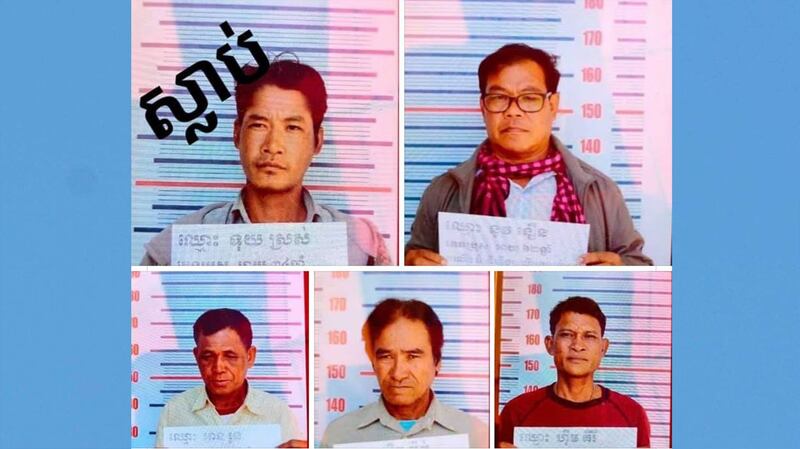Four villagers who were tortured by police in Cambodia’s Banteay Meanchey province and the widow of a fifth man who died of his injuries have demanded tougher punishments for two military police officers who were sentenced to between four and seven years in prison for torture and murder in detention.
On Jan. 13, the Banteay Meanchey Provincial Court found Sar Bun Soeung, deputy commander of the province’s gendarmerie, and Chhoy Ratana of the provincial Anti-Drug Office guilty of “intentional acts of violence with aggravating circumstance” under Articles 218 and 223 of the Criminal Code.
Sar Bun Soeung was handed a four-year jail term and ordered to pay 20-30 million riel (U.S. $4,940-7,410) in compensation for injuring five detainees. Chhoy Ratana was sentenced to seven years in prison and ordered to pay 20-30 million riels to four of victims each in compensation, and 40 million riel (U.S. $9,875) to the family of the fifth villager, who later died of injuries sustained. The two officers were sent to Banteay Meanchey Provincial Prison.
Speaking to RFA’s Khmer Service following the verdict, victims said they would not accept the punishments because they felt the court was too lenient.
One victim, 59-year-old An Ruon, said the two officers kicked and tortured him “like an animal,” causing him to dislocate his right rib and preventing him from working.
“I cannot accept the sentence—it is very unfair for me because I have been disabled for life,” he said.
“I lost a lot of work. I am old and I cannot do anything. I took a lot of money from the bank to treat my injuries, but no doctor can cure me.”
Another victim, Nouv Noeun, said that the court ordered compensation is not enough to treat the condition that resulted from his injury.
“The law should help find justice for me and the dead,” he said, noting that he was not given the opportunity to present his case during the hearing.

Land dispute detentions
On Dec. 29, 2019, the Banteay Meanchey Provincial Gendarmerie arrested five villagers, detained them, and beat them after more than 100 people protested in front of the Provincial Hall demanding a solution to their land dispute in Svay Chek district. Four of the villagers suffered severe injuries and the fifth—Tuy Sros—died on Jan. 1, 2020.
Relevant authorities initially ignored calls for an investigation into the matter. However, the two officers were arrested on Jan. 18, 2020 after Prime Minister Hun Sen ordered a probe following complaints from victims and witnesses.
Soeng Senkaruna, a spokesman for the Cambodian rights group ADHOC, told RFA he feels that in a case involving an act of torture by the authorities, the court should have punished the perpetrators to the fullest extent of the law.
“The sentences can have a negative impact in that officials won’t be afraid to commit crimes or follow these bad examples,” he said. “The punishment does not fit the crime.”
Appeal filed
On Tuesday, the victims filed an appeal of the lower court’s decision.
An Ruon, told RFA on the day of the filing that he and the other victims will not be satisfied until the sentences are increased.
“It is too light a punishment for people who killed someone and caused others to be disabled for the rest of their lives,” he said.
“I want the court to punish them severely. Money is not important; it is important to find justice for me.”
Tuy Sros’s wife, Bui Kimlak, echoed An Ruon’s concerns. The 37-year-old woman said that since her husband's death, her life has become very difficult.
“I'm in pain—now I’m with my mother and my children, but no one is taking care of me and I owe a lot of money to the bank,” she said.
“They made me lose my husband. It is very difficult for me to earn enough to eat. Every night, I put my children to sleep and cry.”
The victims told RFA that if the Appeals Court does not provide them justice, they plan to appeal to the Supreme Court.
Human rights groups have long condemned a culture of impunity in Cambodia that allows authorities to escape consequences for serious abuses of civilians.
Reported by RFA’s Khmer Service. Translated by Samean Yun. Written in English by Joshua Lipes.
